Abstract
Recent studies have shown that treatment of pulmonary tuberculosis with isoniazid plus p-aminosalicylic acid (PAS) at home is, in the majority of cases, as satisfactory as treatment with the same combination of drugs in sanatorium and does not appear to expose the patient's contacts to any special risk. Before mass domiciliary chemotherapy can be introduced, however, a question that has to be decided is what drug or drugs and what dosage and rhythm of administration will be most effective.
This paper presents the results of a controlled comparison of four chemotherapeutic regimens: (a) 3.9-5.5 mg/kg body-weight of isoniazid plus 0.2-0.3 g/kg body-weight of PAS (sodium salt) daily in two doses (the standard combined chemotherapy); (b) 7.8-9.6 mg/kg body-weight of isoniazid alone daily in one dose; (c) 7.8-9.6 mg/kg body-weight of isoniazid alone daily in two doses; (d) 3.9-5.5 mg/kg body-weight of isoniazid alone daily in two doses. Isoniazid plus PAS proved to be the most satisfactory regimen; it was clinically effective and there were very few toxic manifestations.
Full text
PDF



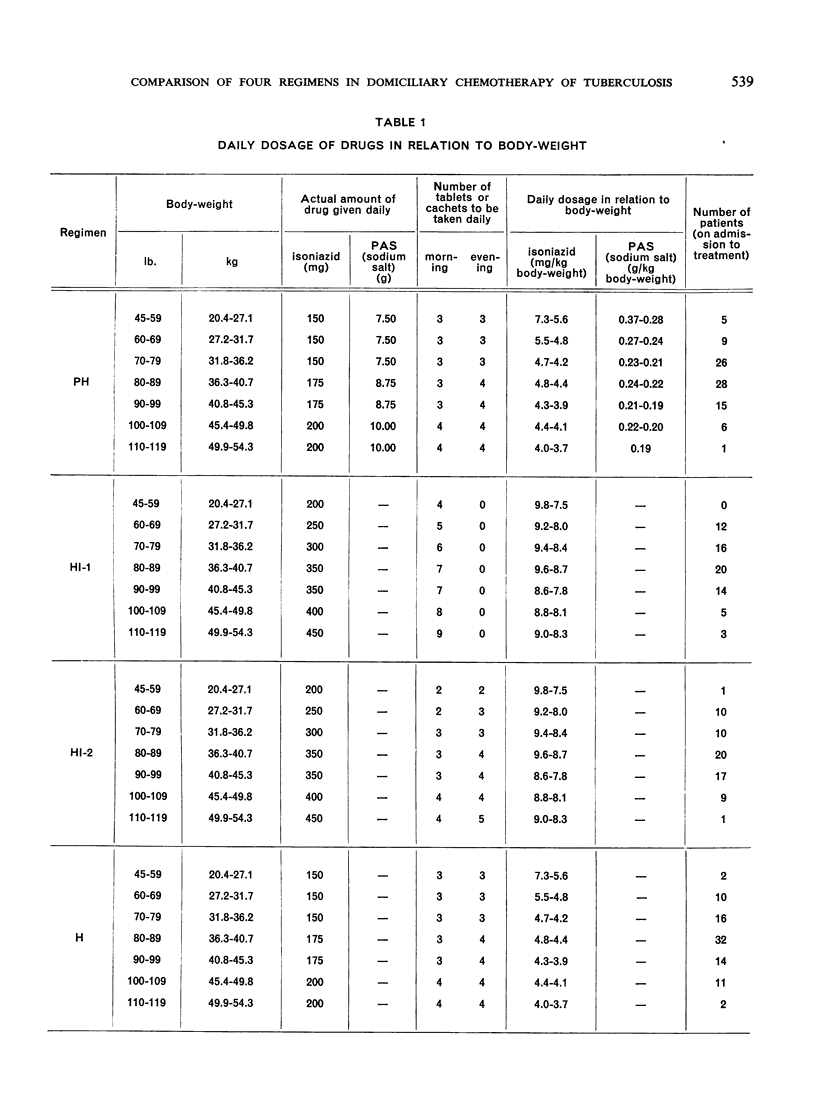


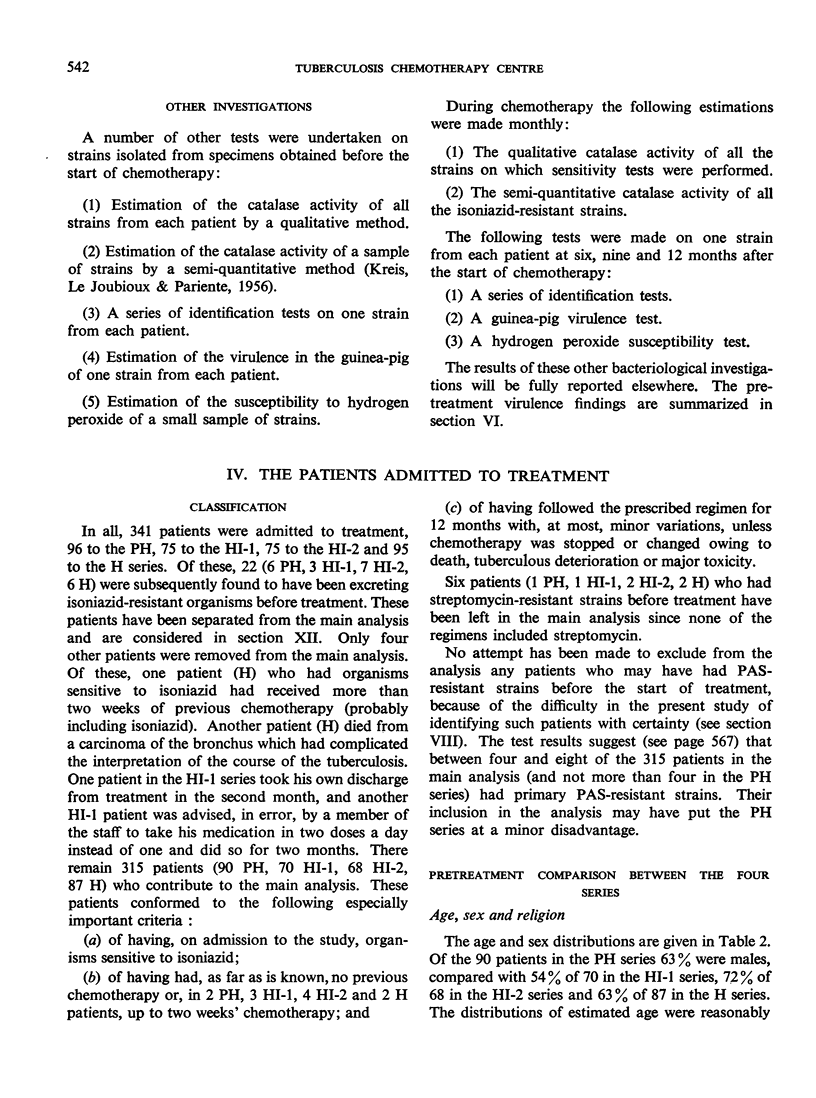







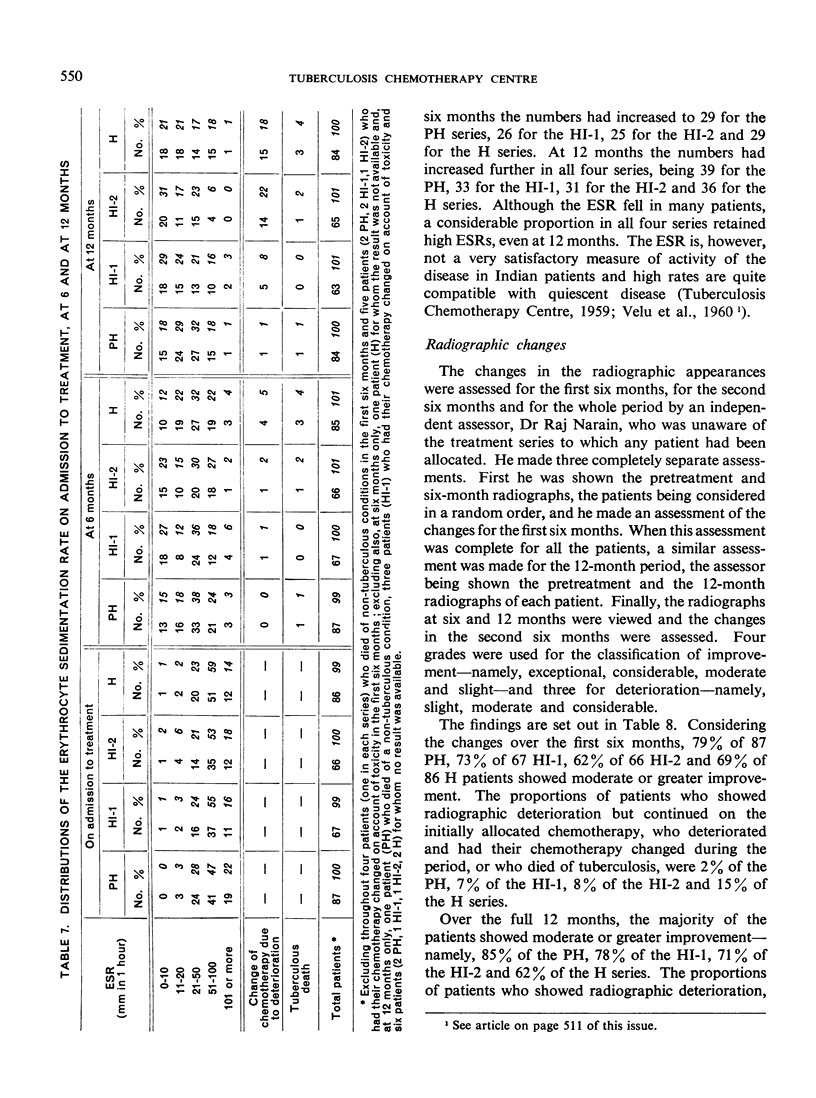





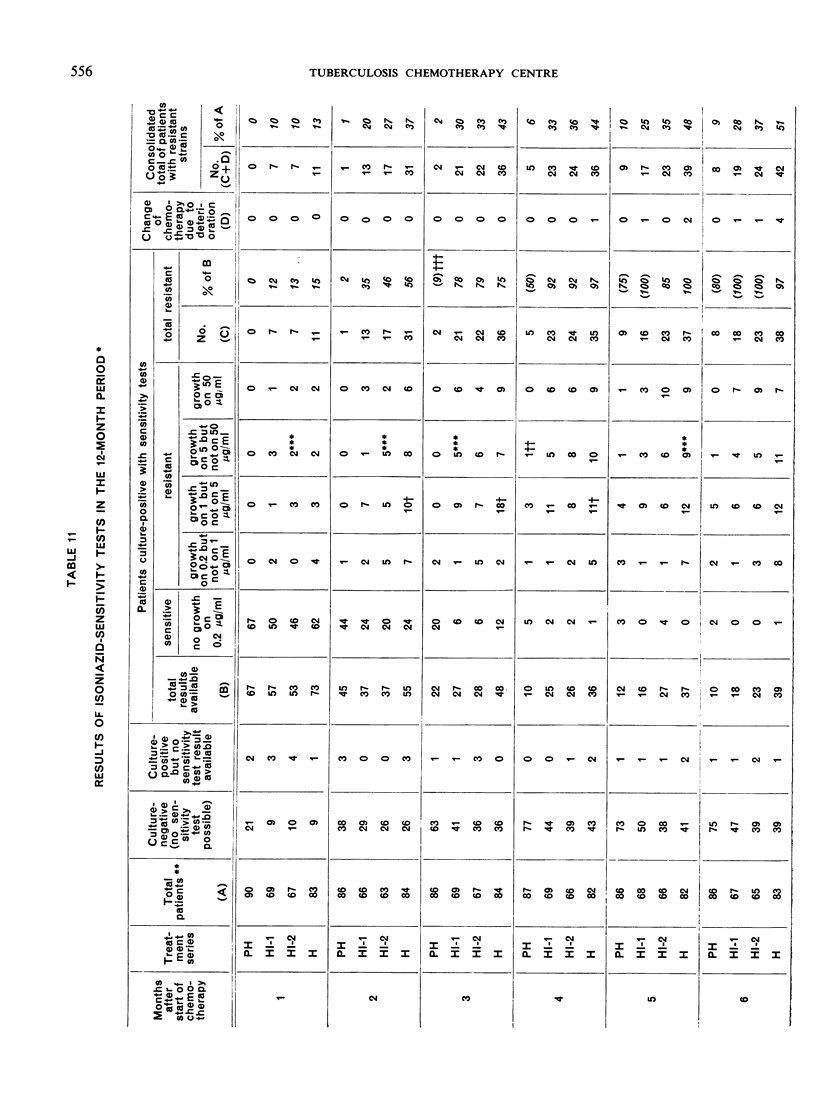




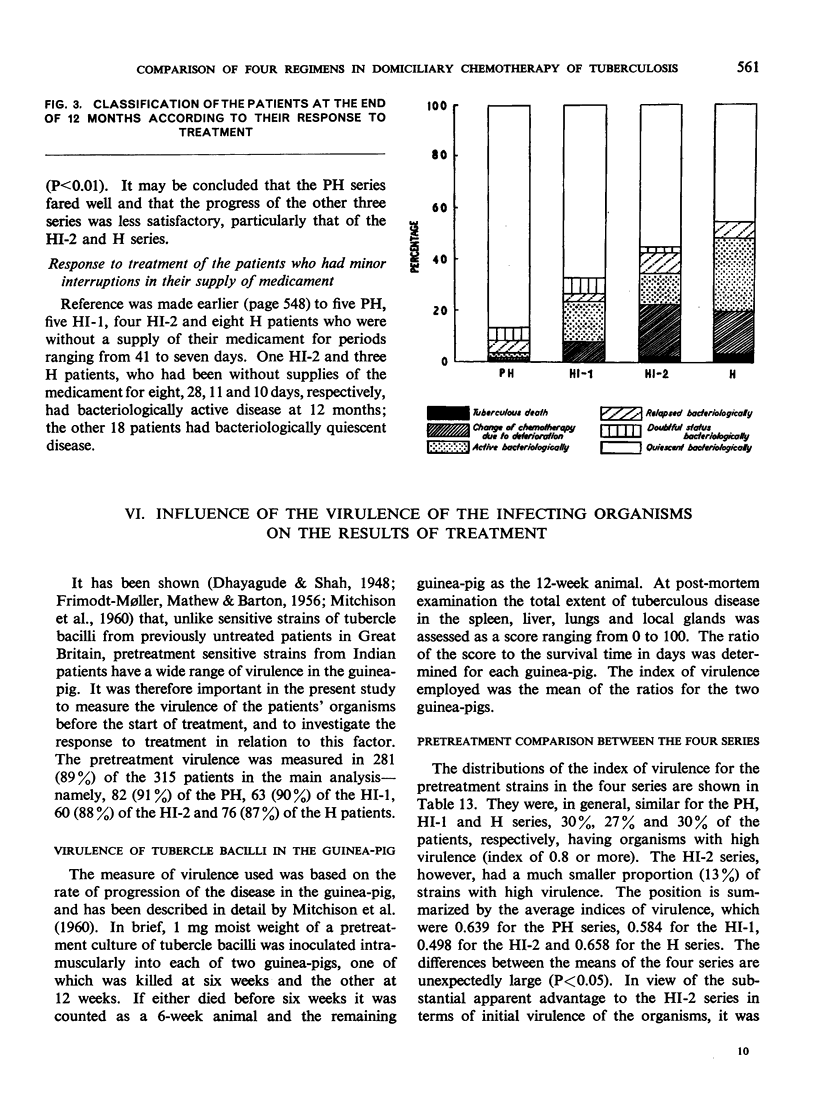











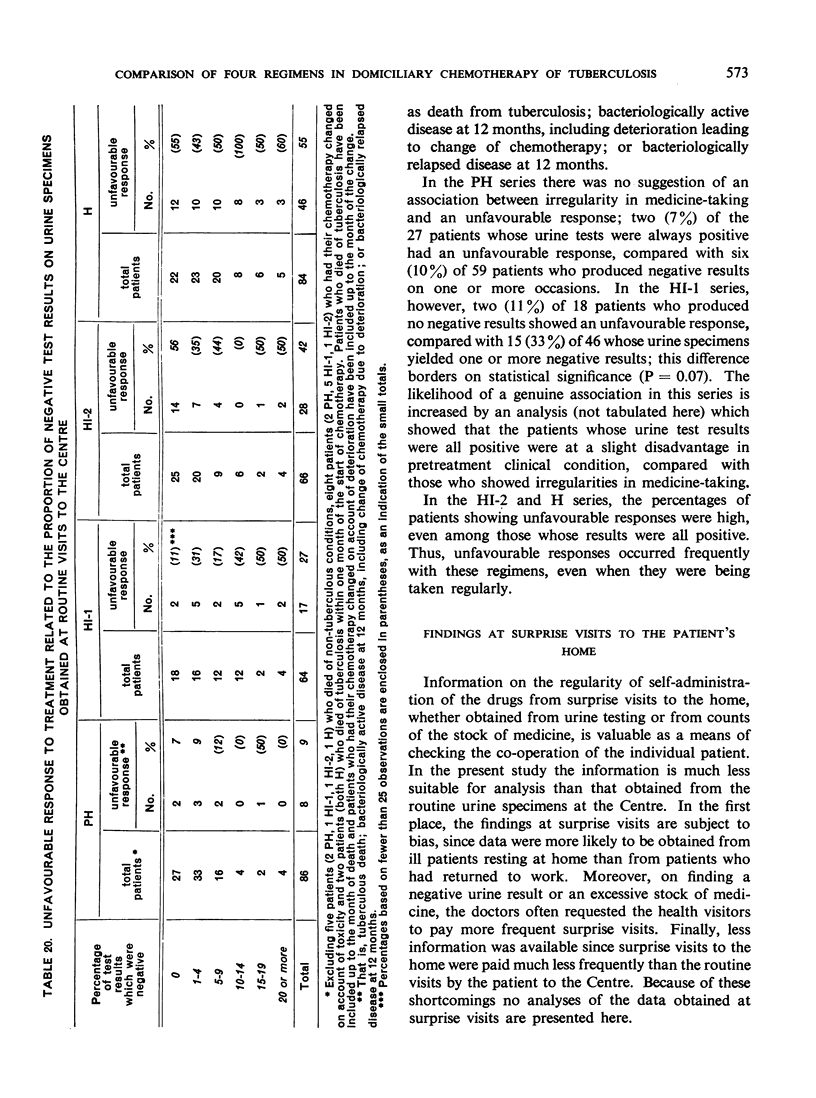








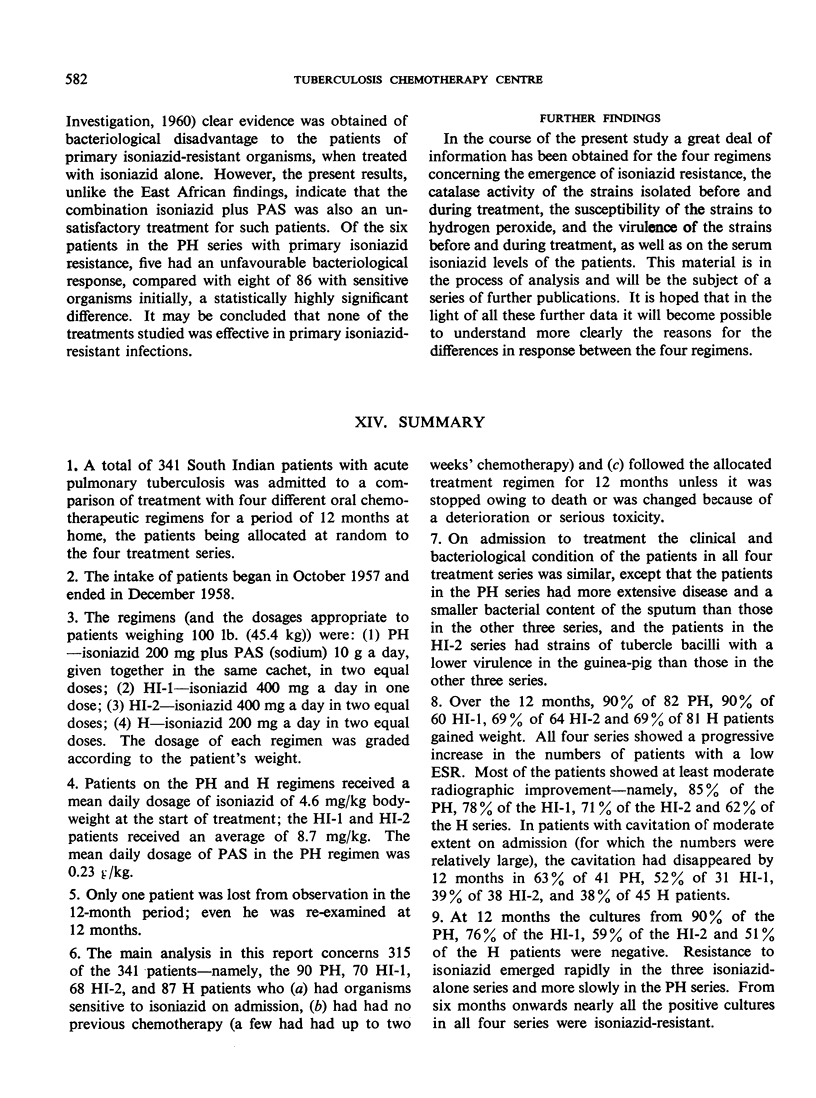



Selected References
These references are in PubMed. This may not be the complete list of references from this article.
- ADAMSON C., IKARD S., TCHERTKOFF I., YILMAZ R. Large dose isoniazid regimen for pulmonary tuberculosis; effect of glutamic acid; management of drug toxicity with pyridoxine. Sea View Hosp Bull. 1956 Jul;16(2):62–79. [PubMed] [Google Scholar]
- ANDREWS R. H., DEVADATTA S., FOX W., RADHAKRISHNA S., RAMAKRISHNAN C. V., VELU S. Prevalence of tuberculosis among close family contacts of tuberculous patients in South India, and influence of segregation of the patient on early attack rate. Bull World Health Organ. 1960;23:463–510. [PMC free article] [PubMed] [Google Scholar]
- BARNETT M., BUSBY S. R., MITCHISON D. A. Tubercle bacilli resistant to isoniazid: virulence and response to treatment with isoniazid in guinea-pigs and mice. Br J Exp Pathol. 1953 Oct;34(5):568–581. [PMC free article] [PubMed] [Google Scholar]
- BIEHL J. P., NIMITZ H. J. Studies on the use of high dose of isoniazid. I. Toxicity studies. Am Rev Tuberc. 1954 Sep;70(3):430–441. doi: 10.1164/art.1954.70.3.430. [DOI] [PubMed] [Google Scholar]
- BIEHL J. P., VILTER R. W. Effect of isoniazid on vitamin B6 metabolism; its possible significance in producing isoniazid neuritis. Proc Soc Exp Biol Med. 1954 Mar;85(3):389–392. doi: 10.3181/00379727-85-20891. [DOI] [PubMed] [Google Scholar]
- CHAUDHURI S. An Indian village. Lancet. 1959 Jan 17;1(7064):144–145. doi: 10.1016/s0140-6736(59)90021-2. [DOI] [PubMed] [Google Scholar]
- DEUSCHLE K., ORMOND L., ELMENDORF D., Jr, MUSCHENHEIM C., McDERMOTT W. The course of pulmonary tuberculosis during long-term single-drug (isoniazid) therapy. Am Rev Tuberc. 1954 Aug;70(2):228–265. doi: 10.1164/art.1954.70.2.228. [DOI] [PubMed] [Google Scholar]
- DEVADATTA S., GANGADHARAM P. R., ANDREWS R. H., FOX W., RAMAKRISHNAN C. V., SELKON J. B., VELU S. Peripheral neuritis due to isoniazid. Bull World Health Organ. 1960;23:587–598. [PMC free article] [PubMed] [Google Scholar]
- DIXON W. M., STRADLING P., WOOTTON I. D. Outpatient P.A.S. therapy. Lancet. 1957 Nov 2;273(7001):871–872. doi: 10.1016/s0140-6736(57)90006-5. [DOI] [PubMed] [Google Scholar]
- FOX W., SUTHERLAND I. A five-year assessment of patients in a controlled trial of streptomycin, para-aminosalicylic acid, and streptomycin plus para-aminosalicylic acid, in pulmonary tuberculosis. Q J Med. 1956 Apr;25(98):221–243. [PubMed] [Google Scholar]
- GANGADHARAM P. R., MITCHISON D. A., SUBBAIAH T. V., SHORT E. I. [The detection of isoniazid in urine]. Tubercle. 1958 Aug;39(4):191–200. doi: 10.1016/s0041-3879(58)80067-7. [DOI] [PubMed] [Google Scholar]
- GROSSET J., CANETTI G., THIBIER R., VIVIEN J. N., LEPEUPLE J., SAENZ A., Jr Effet comparé du P.A.S. buccal et du P.A.S. intra-veineux sur le taux d'isoniazide actif dans le sérum sanguin. Rev Tuberc. 1958 Feb-Mar;22(2-3):202–207. [PubMed] [Google Scholar]
- JOHNSON W., CORTE G. Inhibition of isoniazid acetylation in vitro and vivo. Proc Soc Exp Biol Med. 1956 Jun;92(2):446–448. doi: 10.3181/00379727-92-22505. [DOI] [PubMed] [Google Scholar]
- KASS I., RUSSELL W. F., Jr, HEATON A., MIYAMOTO T., MIDDLEBROOK G., DRESSLER S. H. Changing concepts in the treatment of pulmonary tuberculosis. Ann Intern Med. 1957 Oct;47(4):744–761. doi: 10.7326/0003-4819-47-4-744. [DOI] [PubMed] [Google Scholar]
- KREIS B., LE JOUBIOUX E., PARIENTE D. Hétérogenéité des taux catalasiques dans les populations de bacilles tuberculeux isoniazido-resistantes. Ann Inst Pasteur (Paris) 1956 Dec;91(6):932–935. [PubMed] [Google Scholar]
- LEVY D., RUSSELL W. F., Jr, MIDDLEBROOK G. Dosages of isoniazid and streptomycin for routine chemotherapy of tuberculosis. Tubercle. 1960 Feb;41:23–31. doi: 10.1016/s0041-3879(60)80020-7. [DOI] [PubMed] [Google Scholar]
- LUNTZ G. R., AUSTIN R. New stick test for P.A.S. in urine. Report on use of "phenistix" and problems of long-term chemotherapy for tuberculosis. Br Med J. 1960 Jun 4;1(5187):1679–1684. doi: 10.1136/bmj.1.5187.1679. [DOI] [PMC free article] [PubMed] [Google Scholar]
- MANDEL W., COHN M. L., RUSSELL W. F., Jr, MIDDLEBROOK G. Effect of para-aminosalicylic acid on serum isoniazid levels in man. Proc Soc Exp Biol Med. 1956 Mar;91(3):409–411. doi: 10.3181/00379727-91-22278. [DOI] [PubMed] [Google Scholar]
- MIDDLEBROOK G., COHN M. L. Some observations on the pathogenicity of isoniazid-resistant variants of tubercle bacilli. Science. 1953 Sep 11;118(3063):297–299. doi: 10.1126/science.118.3063.297. [DOI] [PubMed] [Google Scholar]
- MIDDLEBROOK G., DRESSLER S. H. Clinical evaluation of isoniazid. Am Rev Tuberc. 1954 Dec;70(6):1102–1103. doi: 10.1164/art.1954.70.6.1102. [DOI] [PubMed] [Google Scholar]
- MITCHISON D. A., WALLACE J. G., BHATIA A. L., SELKON J. B., SUBBAIAH T. V., LANCASTER M. C. A comparison of the virulence in guinea-pigs of South Indian and British tubercle bacilli. Tubercle. 1960 Feb;41:1–22. doi: 10.1016/s0041-3879(60)80019-0. [DOI] [PubMed] [Google Scholar]
- MORSE W. C., WEISER O. L., KUHNS D. M., FUSILLO M., DAIL M. C., EVANS J. R. Study of the virulence of isoniazid-resistant tubercle bacilli in guinea pigs and mice; a preliminary report. Am Rev Tuberc. 1954 Mar;69(3):464–468. doi: 10.1164/art.1954.69.3.464. [DOI] [PubMed] [Google Scholar]
- MOUNT F. W., JENKINS B. E., FEREBEE S. H. Control study of comparative efficacy of isoniazid, streptomycin-isoniazid, and streptomycin; para-aminosalicylic acid in pulmonary tuberculosis therapy. IV. Report on forty-week observations on 583 patients with streptomycin susceptible infections. Am Rev Tuberc. 1953 Aug;68(2):264–269. doi: 10.1164/art.1953.68.2.264. [DOI] [PubMed] [Google Scholar]
- McCUNE R., DEUSCHLE K., McDERMOTT W. The delayed appearance of isoniazid antagonism by pyridoxine in vivo. Am Rev Tuberc. 1957 Dec;76(6):1100–1105. doi: 10.1164/artpd.1957.76.6.1100. [DOI] [PubMed] [Google Scholar]
- OESTREICHER R., DRESSLER S. H., RUSSELL W. F., Jr, GROW J. B., MIDDLEBROOK G. Observations on the pathogenicity of isoniazid-resistant mutants of tubercle bacilli for tuberculous patients. Am Rev Tuberc. 1955 Mar;71(3 Pt 1):390–405. doi: 10.1164/artpd.1955.71.3-1.390. [DOI] [PubMed] [Google Scholar]
- PEIZER L. R., WIDELOCK D., KLEIN S. Virulence in guinea pigs of isoniazidresistant cultures isolated from clinical specimens; a preliminary report. Am Rev Tuberc. 1953 Aug;68(2):290–291. doi: 10.1164/art.1953.68.2.290. [DOI] [PubMed] [Google Scholar]
- PHILLIPS S. Comparison of isoniazid alone with isoniazid--PAS in the original chemotherapy of noncavitary pulmonary tuberculosis. Results from the Veterans Administration-Armed Forces co-operative study on the chemotherapy of tuberculosis. Am Rev Respir Dis. 1959 Nov;80:641–647. doi: 10.1164/arrd.1959.80.5.641. [DOI] [PubMed] [Google Scholar]
- SELKON J. B., SUBBAIAH T. V., BHATIA A. L., RADHAKRISHNA S., MITCHISON D. A. A comparison of the sensitivity to p-aminosalicylic acid of tubercle bacilli from South Indian and British patients. Bull World Health Organ. 1960;23:599–611. [PMC free article] [PubMed] [Google Scholar]
- SIMPSON J. M. Simple tests for the detection of urinary PAS. Tubercle. 1956 Oct;37(5):333–340. doi: 10.1016/s0041-3879(56)80079-2. [DOI] [PubMed] [Google Scholar]
- VELU S., ANDREWS R. H., DEVADATTA S., FOX W., RADHAKRISHNA S., RAMAKRISHNAN C. V., SELKON J. B., SOMASUNDARAM P. R., SUBBAIAH T. V. Progress in the second year of patients with quiescent pulmonary tuberculosis after a year of chemotherapy at home or in sanatorium, and influence of further chemotherapy on the relapse rate. Bull World Health Organ. 1960;23:511–533. [PMC free article] [PubMed] [Google Scholar]
- WYNN-WILLIAMS N., ARRIS M. On omitting PAS. Tubercle. 1958 Jun;39(3):138–142. doi: 10.1016/s0041-3879(58)80040-9. [DOI] [PubMed] [Google Scholar]


